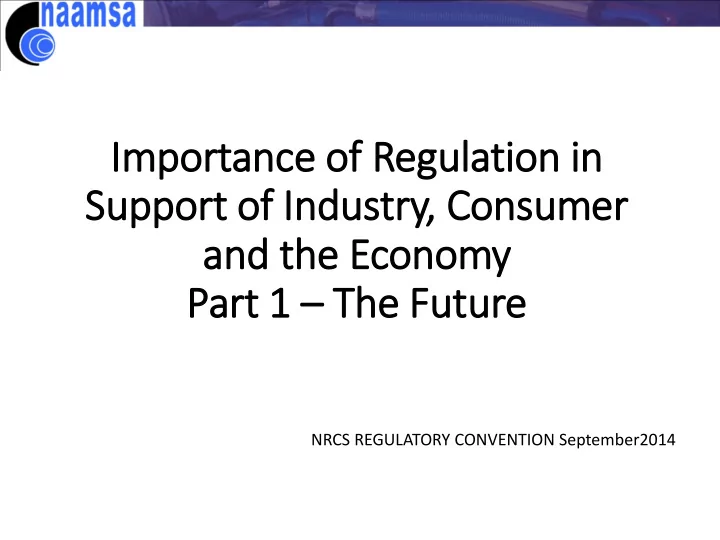

Im Importance of f Regulation in in Support of In Industry ry, Consumer and the Economy Part 1 – The Future NRCS REGULATORY CONVENTION September2014
CONTENTS Future View of Automotive Technical Development with some Predictions The Implication these Technological Advances have on Legislation Our Inter-dependence on Worldwide Trends in Legislation Is Harmonisation of Regulation possible / desirable?
Future View of Automotive Technical Development with some Predictions Drivers that shape the future: • Urbanisation • Environmental Considerations • Concern for Safety • Cost Concerns • Availability of new Technologies • Availability of Energy Resources • Policy • ………
Future View of Automotive Technical Development Lifestyle 1980 Changed to Lifestyle 2014 Current Trends continue to move in predetermined directions
The Implication these Technological Advances have CO 2 Emissions Drive Train Trailers Tyres Fuel Type Fleet Management Infrastructure Fleet Renewal = Better Fuel Economy
Future View of Automotive Technical Development with some Predictions Trends as a Result of these Drivers • Cars getting smaller • Public transport modes develop • Alternative Fuels such as Electric Power or LNG or CNG • More Fuel Efficient Engines • Alternative Construction Materials • Technology Drive towards more Comfort, Safety Features, ADAS • Connected Cars
The Implication these Technological Advances have or may have on Legislation Trends and Developments as a Result of these Drivers • Cross-over from Motorcycle to Car • More fuel efficient and greater Payload Heavy Vehicles • Multiple engine / motor vehicles • Less Emissions or “no” Emissions • Lighter and stronger Construction • Driver assist Systems take over Control of Vehicle • Semi-automated Driving
The Implication these Technological Advances have on Legislation Examples of Laws and Regulations that are affected • Driver minimum Age, Power and Speed regulation, allowed on which Public Roads • Emission Regulations and Taxes • Licensing of Vehicles, Homologation • Driver assist Systems take over Control of Vehicle – Vienna Convention • Semi-automated Driving Liability Issues
Our inter-dependence on Worldwide Trends in Legislation • New Technologies find their Way to South Africa • Developed Countries have a close Relationship between Laws / Regulations and the New Technology Products • Regulations are updated Regularly and at ever faster Pace as Technology opens new Possibilities • When we allow new Technologies, do we automatically accept new Regulation?
Our inter-dependence on worldwide trends in legislation Challenges of keeping up with the Trends • How fast can we update our Laws? • Do we have the capacity to interpret changes and future Challenges and convert into relevant Regulation? • Who will regulate which Laws / Regulations? • Does it make sense to align with other developing countries to share Resources and Ideas?
Is Harmonisation of Regulation possible / desirable? Developing Economies have other Priorities than most Developed Countries • Affordability • Road Conditions • People Education Are unique Regulations desirable? • Not cost effective to develop own products – reduce Manufacturing Complexity • Parent Manufacturing Companies find it difficult to interpret • Difficult to Regulate different Standards
What are main Requirements to keep up with adequate Regulation Balancing Act to get the best of both Worlds: • Consumer Protection – Safety First. Is it different for Developed and for Developing Economies? • Resist Cost Pressures: Cost of Regulation – Cost of Compliance. Maintain Competitiveness of Motor Industry • Skills Base to be developed to Regulate • Faster Process Times to Change Regulation, while giving sufficient Lead Times to OEMs
Panel Discussion ? ? ?
Recommend
More recommend